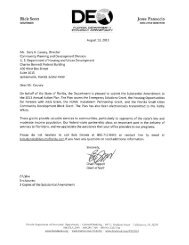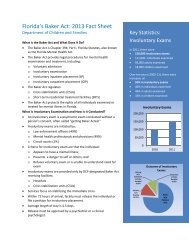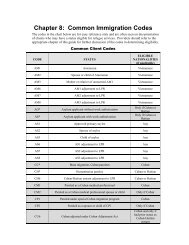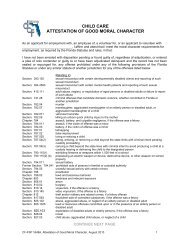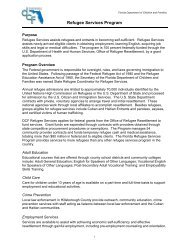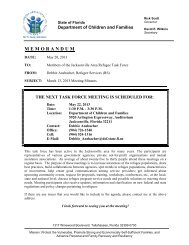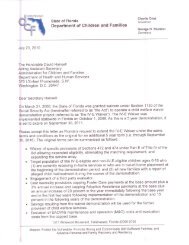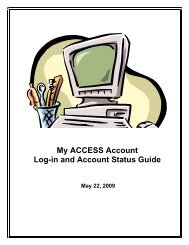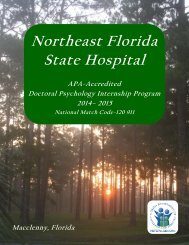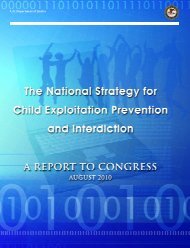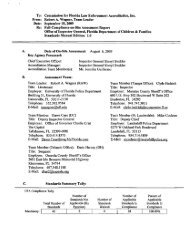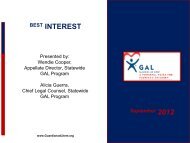Ending Abuse—Improving Lives - Florida Department of Children ...
Ending Abuse—Improving Lives - Florida Department of Children ...
Ending Abuse—Improving Lives - Florida Department of Children ...
Create successful ePaper yourself
Turn your PDF publications into a flip-book with our unique Google optimized e-Paper software.
<strong>Florida</strong> Coalition Against Domestic ViolenceThe <strong>Florida</strong> Coalition Against Domestic Violence (FCADV) isthe pr<strong>of</strong>essional organizationfor the state’scertified domesticviolence centers. Theirmission is “to create aviolence free world by empowering women and childrenthrough the elimination <strong>of</strong> personal and institutional violenceand oppression against all people.”First and foremost, the Coalition administers domestic violencefunding to the certified domestic violence centers. Additionallythey provide educational services to the centers; assistcenters in resolving problematic agency challenges; maintainthe privilege communications database; and oversee thestatewide domestic violence hotline. FCADV also providesleadership, advocacy, education, and public policy developmenton domestic violence and related issues to private andpublic organizations.The Coalition continues to research and invent new ways toimprove upon existing services, as well as identify and supportresources necessary to promote victim safety. Duringthe past two hurricane seasons, 22 centers had to evacuateduring or immediately after the storms, but only threedomestic violence centers had to evacuate because <strong>of</strong> actualdamage to their shelters. The others had to relocate because<strong>of</strong> sustained area-wide loss <strong>of</strong> power. In order to decrease thenumber <strong>of</strong> centers having to evacuate, the Office <strong>of</strong> AttorneyGeneral provided a $250,000 grant to purchase generators forthirteen certified domestic violence centers. In the future, unlessthese centers are in mandatory evacuation zones, there isgreater likelihood that they can remain open during storms tohouse domestic violence victims.This past year FCADV also oversaw a three million dollar18-month emergency assistance grant for domestic violencevictims adversely affected by the myriad <strong>of</strong> hurricanes thatcrisscrossed the state the previous two hurricane seasons.Victims <strong>of</strong> domestic violence and their children were providedwith emergency relief to assist with relocation, rent, utilities,transportation, counseling, and daycare. Approximately12,000 victims received services from this grant.The Domestic Violence and Disability Project that wasdeveloped in the previous fiscal year continued in FY2005-2006 with four trainings being provided to advocateswho specialize in the needs <strong>of</strong> disabled victims <strong>of</strong>domestic and sexual violence.Additionally, the department continues to contract withFCADV to provide technical assistance and training to the certifieddomestic violence centers and to expand and enhanceservices to victims <strong>of</strong> domestic violence. During FY 2005-2006,FCADV received $21,199,651 through state and federal funding.The following highlights their activities for FY 2005-2006.Community Education and Technical AssistanceThe toll-free statewide domestic violence hotline forwarded25,199 calls for information and assistance to domesticviolence centers during FY 2005-2006, compared to 20,007 inFY 2004-2005. The increase in hotline calls may be attributedto the broad distribution <strong>of</strong> brochures, posters, and specialtyitems conveying information (local telephone numbers andcontact information regarding services) that were sent to thecertified domestic violence centers. Of greater significance,however, is that during FY 2005-2006, 11,868 technical assistancecalls and electronic contacts were received by FCADVcompared to 8,857 received in FY 2004-2005, a 34 percentincrease in such requests for assistance. Topics <strong>of</strong> inquiryincluded assistance for interpreting FCADV Minimum ProgramStandards, updates on contracts, privileged databaseinformation, and how to get an out-<strong>of</strong>-state survivor shelterservice in <strong>Florida</strong>. FCADV conducted 44 technical assistancevisits to domestic violence centers and partnering agencies,and conducted 62 onsite trainings to over 849 participantsfrom the local domestic violence centers.Additionally, FCADV received 956 technical assistance callsand electronic contacts for specialized information onpersons living with disabilities who experience domesticviolence. Eleven technical assistance visits were made tocertified domestic violence centers to address workingwith persons living with disabilities who experience domesticviolence.TrainingTraining institutes <strong>of</strong>fered information on a variety <strong>of</strong>topics including legal issues affecting children, confidentiality,TANF, popular education for social change,as well as the core competency training institute foradvocates seeking victim/advocate privilege. Additionaltraining included an advanced advocacy leadershipinstitute for battered/ formerly battered women, a childwelfare institute, and advanced training focusing onnew trends and issues in intimate partner violence. TheStatewide Annual Training Institute, Beyond the Divide,Seeking Equality, Taking Action: Exploring EconomicJustice to End Violence Against Women, was conductedDomestic Violence Annual Report 2005-200617



